In today’s fast-paced digital landscape, email marketing remains a vital strategy for businesses looking to connect with their audience and drive results. To effectively manage and optimize your campaigns, it’s essential to choose an email marketing platform that meets your specific needs.
In this comprehensive guide, we’ll explore the top 11 email marketing platforms in 2023, highlighting their key features, pros and cons, and pricing plans.
1. e-Goi
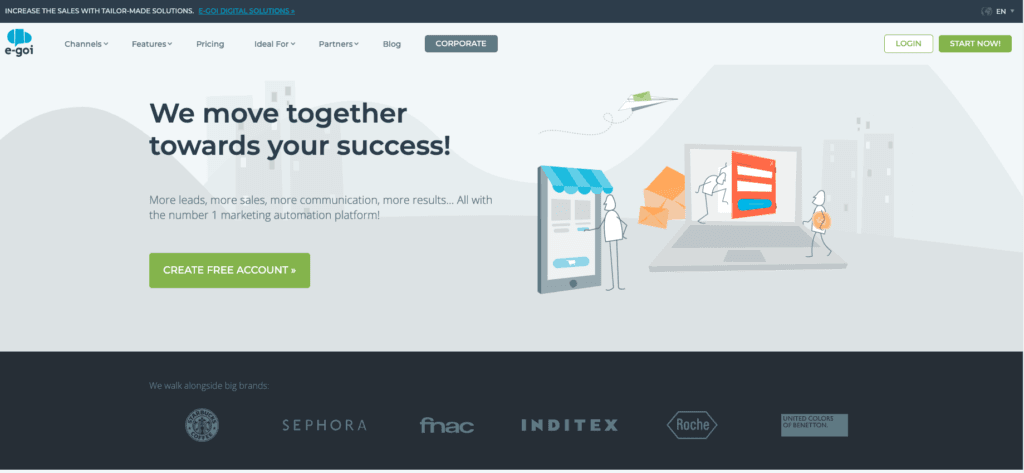
e-Goi stands out as a robust and user-friendly email marketing platform, offering a wide range of features such as automation, segmentation, and multi-channel marketing. It also provides SMS marketing capabilities, enabling you to reach customers across various platforms. e-Goi’s pricing structure caters to businesses of all sizes, with plans that scale according to your needs.
Best for: Small to medium-sized businesses looking for a versatile email marketing platform with multi-channel capabilities.
Key features:
- Email automation
- Segmentation and targeting
- SMS and multi-channel marketing
Pros:
- Easy-to-use interface
- Powerful automation tools
- SMS and multi-channel marketing options
Cons:
- Limited template selection compared to competitors
- No free plan available
Pricing and plans:
- e-Goi offers several pricing plans based on the number of subscribers, starting from $15/month. Visit their website for a detailed breakdown of pricing.
2. Mailchimp
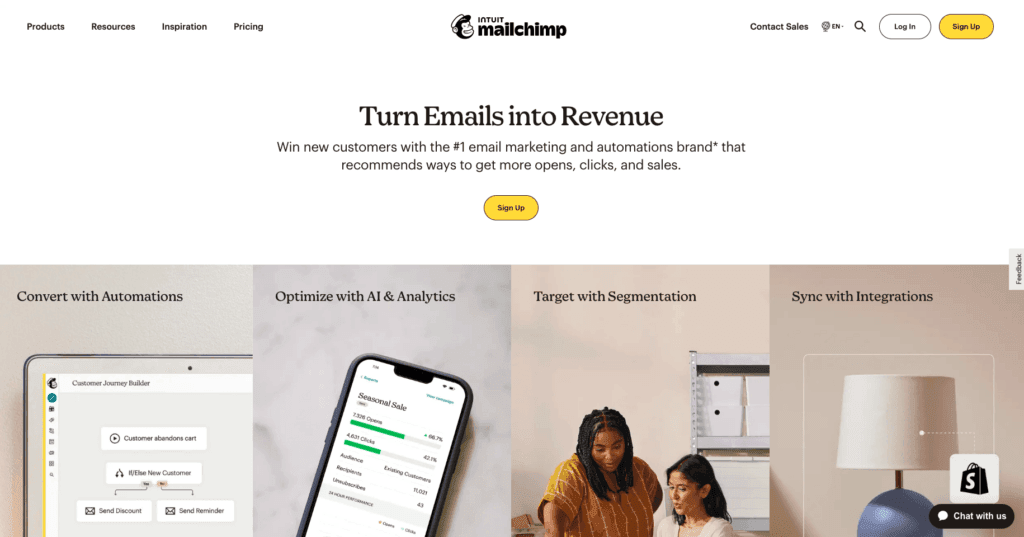
Mailchimp is a versatile email marketing platform that provides a comprehensive suite of tools. Some of its key features include automation, A/B testing, and landing page creation. With a vast library of templates and integrations, Mailchimp is suitable for businesses of all sizes.
Best for: Small to large businesses seeking a feature-rich email marketing platform.
Key features:
- Email automation
- A/B testing
- Landing page creation
Pros:
- User-friendly interface and drag-and-drop editor
- Advanced automation options and A/B testing
- Wide range of templates and integrations
Cons:
- Can be expensive for larger businesses
- Limited customization options for templates
Pricing and plans:
- Mailchimp offers a Free plan with basic features and three paid plans: Essentials, starting at $9.99/month; Standard, starting at $14.99/month; and Premium, starting at $299/month. Prices vary based on the number of subscribers.
3. ActiveCampaign
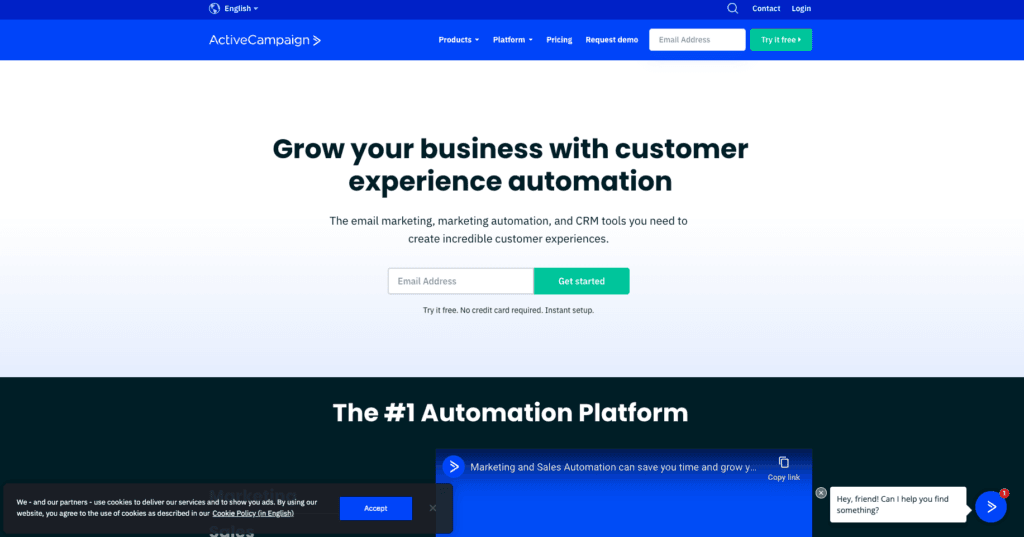
ActiveCampaign is known for its advanced automation and CRM capabilities, making it ideal for businesses focused on customer relationships and personalization. Its platform includes features such as lead scoring, segmentation, and behavioral tracking.
Best for: Small to medium-sized businesses looking for advanced automation and CRM features.
Key features:
- Advanced email automation
- CRM and sales automation
- Lead scoring and behavioral tracking
Pros:
- Powerful automation and CRM tools
- Extensive segmentation options
- Behavioral tracking and lead scoring
Cons:
- Steeper learning curve compared to competitors
- No built-in landing page builder
Pricing and plans:
- ActiveCampaign offers four pricing plans: Lite, starting at $9/month; Plus, starting at $49/month; Professional, starting at $129/month; and Enterprise, starting at $229/month. Prices depend on the number of subscribers.
4. Sendinblue
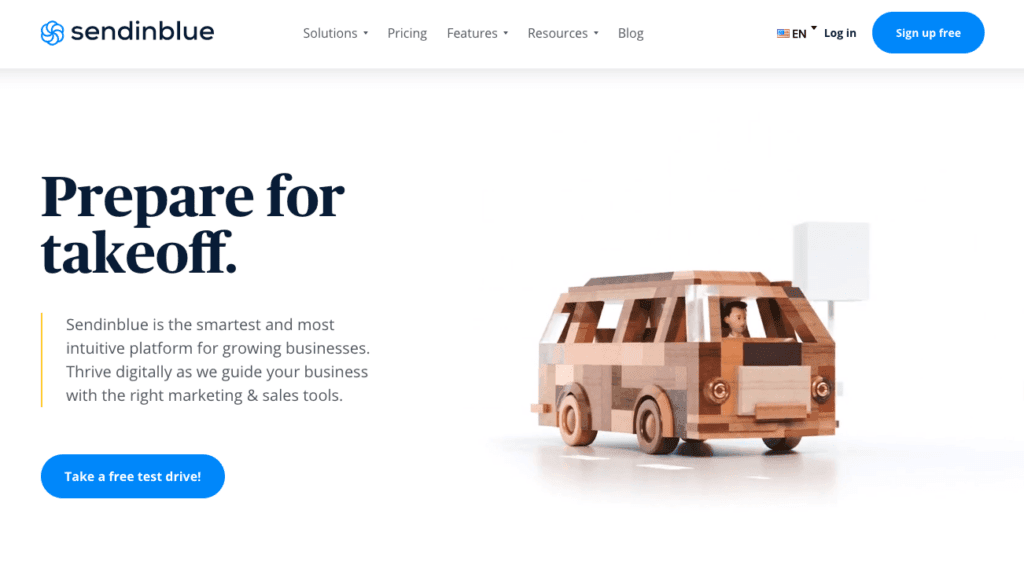
Sendinblue is a platform with a strong focus on transactional emails, SMS marketing, and automation. Offering a range of pricing plans, it caters to businesses of various sizes. Its features include drag-and-drop email design, segmentation, and real-time analytics.
Best for: Small to medium-sized businesses seeking a platform with a focus on transactional emails and SMS marketing.
Key features:
- Transactional emails
- SMS marketing
- Email automation
Pros:
- Powerful automation and segmentation
- Transactional email and SMS marketing capabilities
- Real-time analytics and reporting
Cons:
- Limited template designs compared to competitors
- No built-in CRM features
Pricing and plans:
- Sendinblue offers a Free plan with basic features and three paid plans: Lite, starting at $25/month; Premium, starting at $65/month; and custom Enterprise plans. Prices are based on the number of emails sent per month.
5. GetResponse
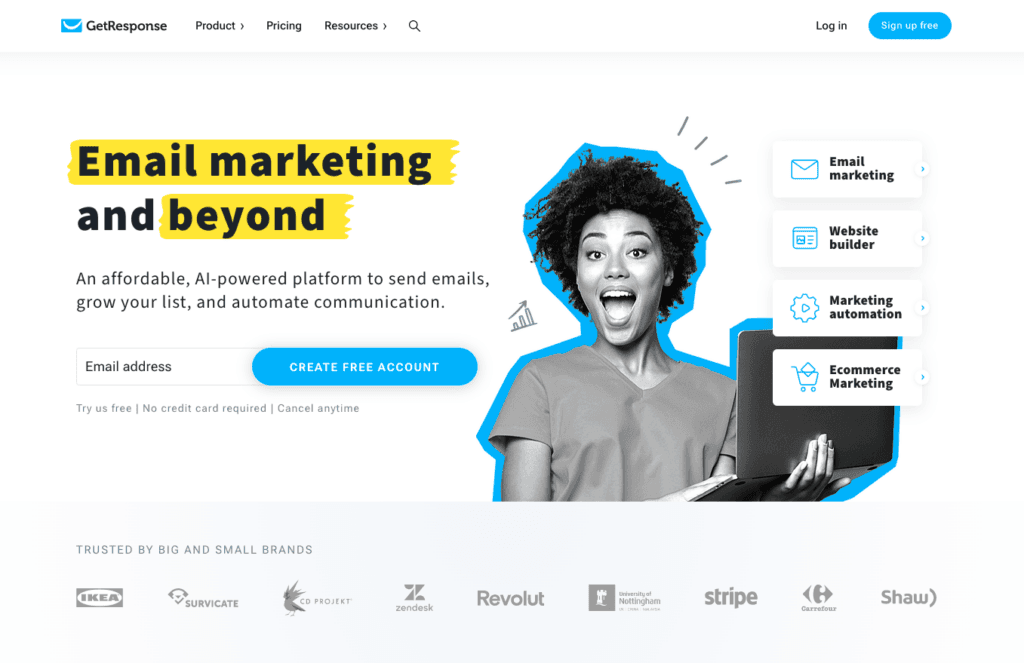
GetResponse is an all-in-one solution that provides email marketing, landing pages, webinars, and marketing automation features. Its easy-to-use interface allows businesses to create professional-looking campaigns with minimal effort.
Best for: Small to medium-sized businesses looking for a comprehensive email marketing solution with additional features like webinars.
Key features:
- Email marketing
- Landing pages
- Webinars
Pros:
- Comprehensive email marketing and automation tools
- Landing page and webinar capabilities
- Responsive design and split testing
Cons:
- No free plan available
- Limited integrations compared to competitors
Pricing and plans:
- GetResponse offers four pricing plans: Basic, starting at $15/month; Plus, starting at $49/month; Professional, starting at $99/month; and custom Enterprise plans starting at $1,199/month. Prices depend on the number of subscribers.
6. ConvertKit
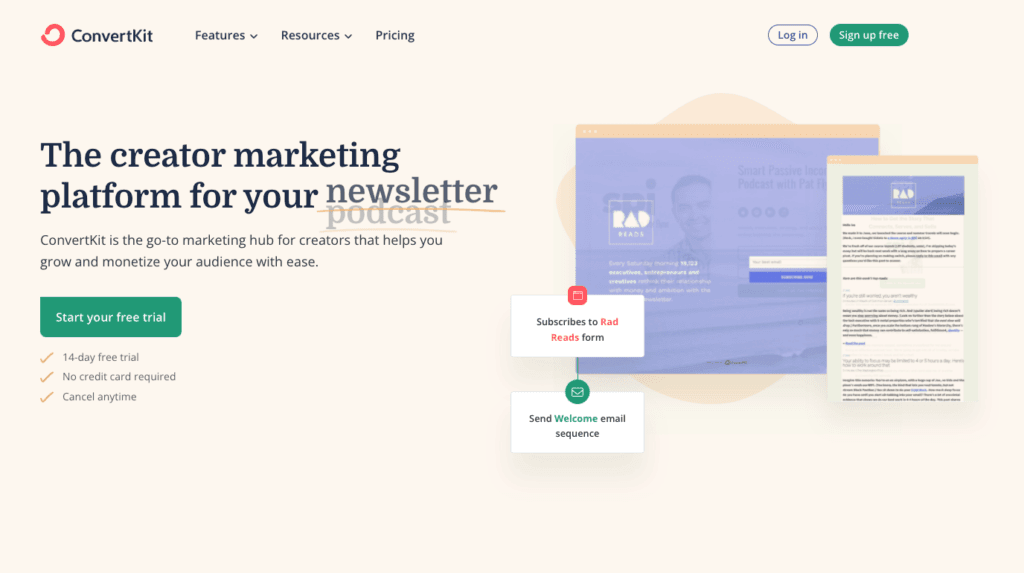
ConvertKit is a popular choice for content creators, offering visual automation builders, segmentation, and customizable forms. Its platform is designed to help creators grow their audience and monetize their content.
Best for: Content creators, bloggers, and small businesses focused on audience growth and content monetization.
Key features:
- Visual automation builders
- Segmentation
- Customizable forms
Pros:
- Built with content creators in mind
- Visual automation builders and segmentation
- Customizable forms and templates
Cons:
- Limited design customization options
- No built-in CRM or advanced analytics
Pricing and plans:
- ConvertKit offers a Free plan with basic features and two paid plans: Creator, starting at $29/month; and Creator Pro, starting at $59/month. Prices are based on the number of subscribers.
7. AWeber
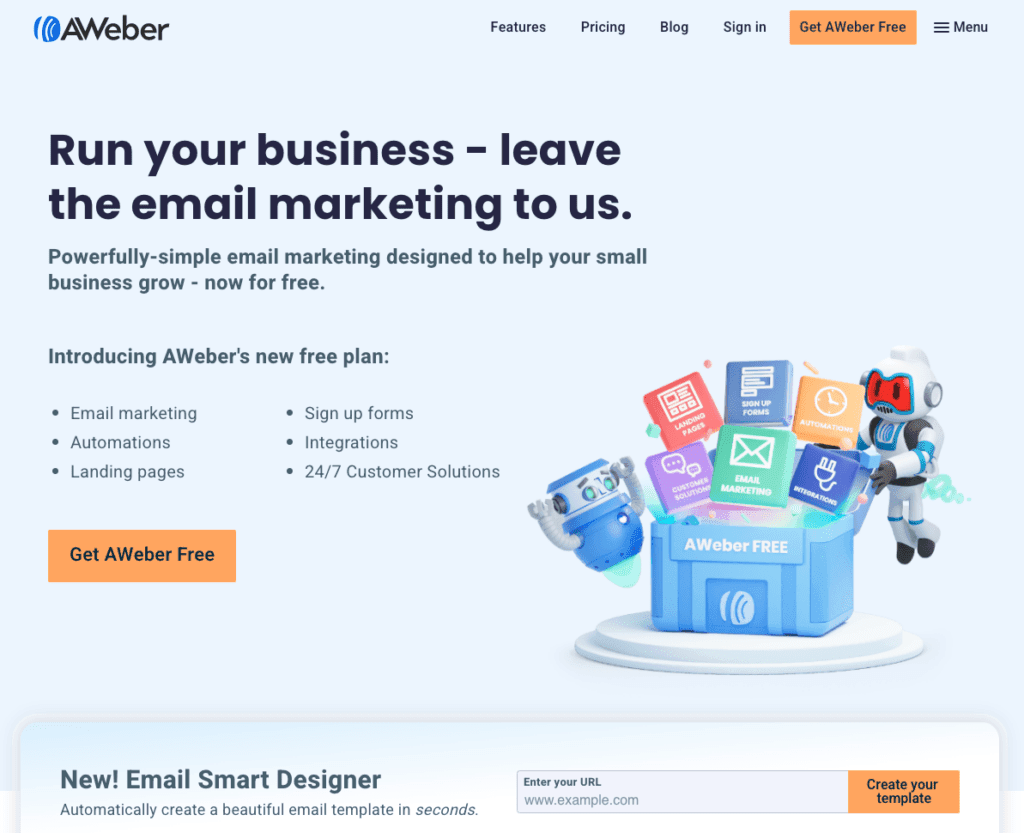
AWeber is a reliable email marketing tool that provides automation, segmentation, and integration capabilities. Catering to small and medium-sized businesses, its platform includes a drag-and-drop editor, responsive templates, and detailed analytics.
Best for: Small to medium-sized businesses looking for a reliable email marketing platform with essential features.
Key features:
- Email automation
- Segmentation
- Integration capabilities
Pros:
- Automation and segmentation tools
- Drag-and-drop editor and responsive templates
- Detailed analytics and reporting
Cons:
- Limited automation features compared to competitors
- No built-in landing page builder
Pricing and plans:
- AWeber offers a Free plan with basic features and a Pro plan starting at $16.15/month. Prices for the Pro plan depend on the number of subscribers.
8. Constant Contact
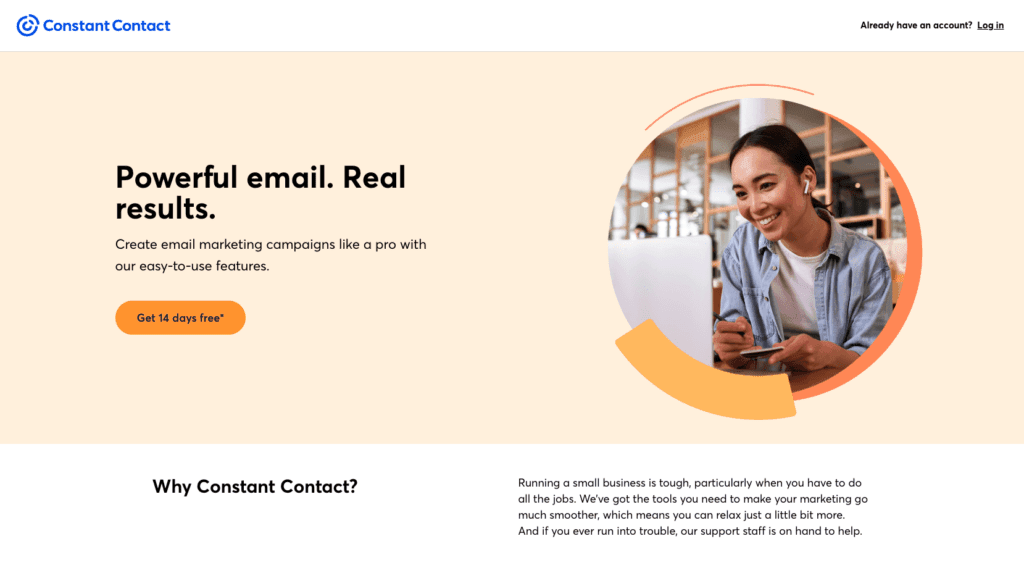
Constant Contact is a user-friendly platform offering a variety of customizable templates, automation features, and integrations. Its email marketing tools are designed to help businesses create professional campaigns and drive results.
Best for: Small businesses and non-profits seeking an easy-to-use platform with customizable templates and automation features.
Key features:
- Customizable templates
- Email automation
- List segmentation
Pros:
- Easy-to-use interface and customizable templates
- Automation and list segmentation features
- Wide range of integrations
Cons:
- Limited advanced automation options
- No built-in CRM or lead-scoring features
Pricing and plans:
- Constant Contact offers two pricing plans: Email, starting at $20/month, and Email Plus, starting at $45/month. Prices are based on the number of subscribers.
9. Drip
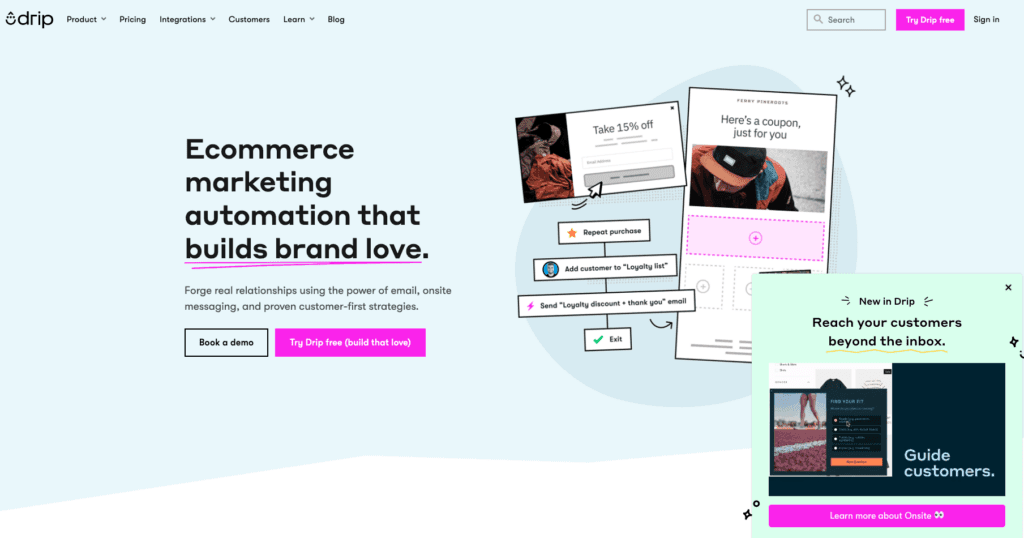
Drip is tailored for e-commerce businesses, offering advanced segmentation, email personalization, and automation tools. Its platform integrates seamlessly with popular e-commerce platforms, helping businesses optimize their marketing efforts and increase sales.
Best for: E-commerce businesses seeking advanced automation, segmentation, and personalization features.
Key features:
- Advanced segmentation and personalization
- E-commerce automation
- Integration with popular e-commerce platforms
Pros:
- Designed specifically for e-commerce businesses
- Advanced segmentation and personalization features
- Seamless integration with e-commerce platforms
Cons:
- May not be suitable for non-e-commerce businesses
- Limited templates and design options
Pricing and plans:
- Drip offers a 14-day free trial and custom pricing plans based on the number of subscribers. Visit their website for a detailed breakdown of pricing.
10. MailerLite
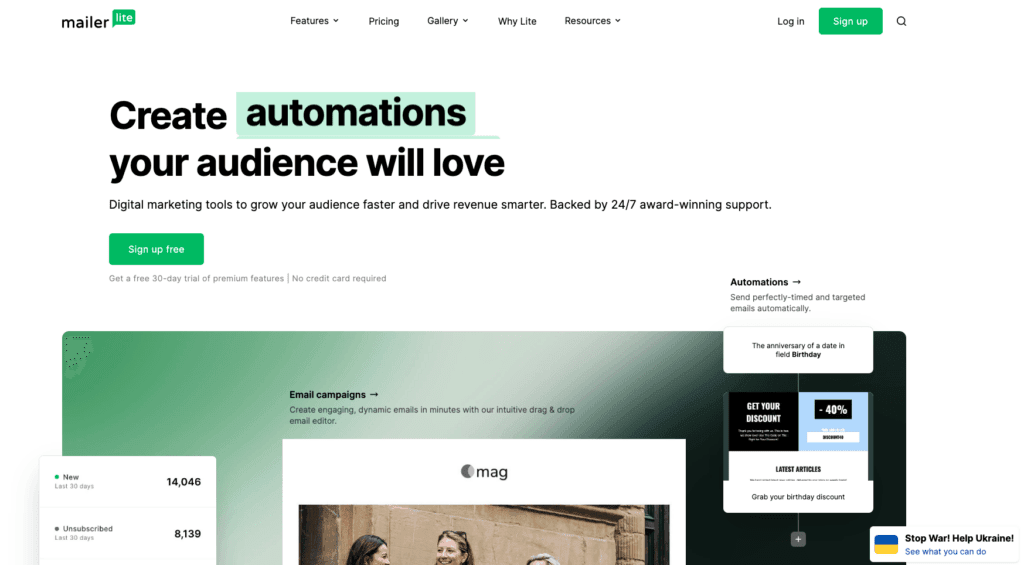
MailerLite is a cost-effective solution for smaller businesses and startups, providing essential email marketing features such as automation, segmentation, and A/B testing. Its user-friendly interface and range of templates make it easy to create professional email campaigns.
Best for: Small businesses and startups seeking a budget-friendly email marketing platform with essential features.
Key features:
- Email automation
- Segmentation
- A/B testing
Pros:
- Intuitive interface and drag-and-drop editor
- Automation, segmentation, and A/B testing capabilities
- Competitive pricing for small businesses and startups
Cons:
- Limited advanced features compared to competitors
- No built-in CRM or lead scoring
Pricing and plans:
- MailerLite offers a Free plan with basic features and several paid plans starting at $10/month. Prices are based on the number of subscribers.
11. Omnisend
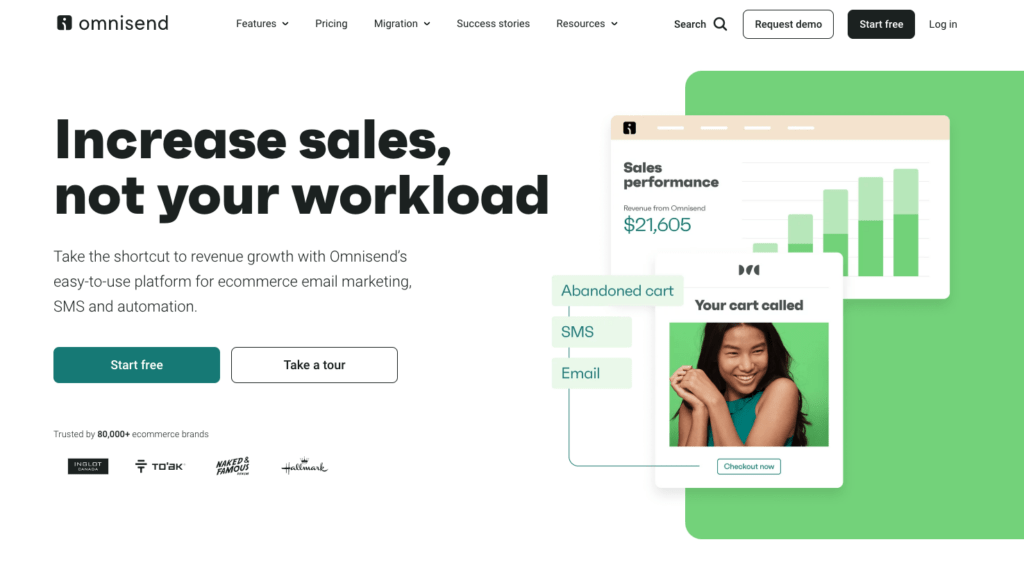
Designed for e-commerce businesses, Omnisend offers advanced automation, segmentation, and multi-channel marketing features. Its platform allows businesses to create personalized marketing campaigns that drive sales and customer engagement.
Best for: E-commerce businesses looking for a comprehensive marketing platform with multi-channel capabilities.
Key features:
- Advanced automation and segmentation
- Multi-channel marketing
- Integration with popular e-commerce platforms
Pros:
- Designed for e-commerce businesses
- Advanced automation, segmentation, and personalization features
- Multi-channel marketing capabilities
Cons:
- May not be suitable for non-e-commerce businesses
- Limited templates and design options
Pricing and plans:
- Omnisend offers a Free plan with basic features and three paid plans: Standard, starting at $16/month; Pro, starting at $99/month; and Enterprise, with custom pricing. Prices are based on the number of subscribers.
Compare all platforms here
| Platform | Pros | Cons |
| e-Goi | Easy-to-use, powerful automation, multi-channel marketing | Limited templates, no free plan |
| Mailchimp | User-friendly, advanced automation, wide range of templates | Expensive for larger businesses, limited customization |
| ActiveCampaign | Powerful automation and CRM, extensive segmentation | Steeper learning curve, no built-in landing page builder |
| Sendinblue | Automation and segmentation, transactional emails and SMS marketing | Limited templates, no built-in CRM |
| GetResponse | Comprehensive tools, landing page and webinar capabilities | No free plan, limited integrations |
| ConvertKit | Built for content creators, visual automation builders | Limited design customization, no built-in CRM or advanced analytics |
| AWeber | Automation and segmentation, drag-and-drop editor | Limited automation features, no built-in landing page builder |
| Constant Contact | Easy-to-use, customizable templates, wide range of integrations | Limited advanced automation, no built-in CRM or lead scoring |
| Drip | Designed for e-commerce, advanced segmentation, seamless integration | Not suitable for non-e-commerce businesses, limited templates |
| MailerLite | Intuitive interface, competitive pricing, essential features | Limited advanced features, no built-in CRM or lead scoring |
| Omnisend | Designed for e-commerce, advanced automation, multi-channel marketing | Not suitable for non-e-commerce businesses, limited templates |
Conclusion
Selecting the right email marketing platform is crucial for the success of your marketing campaigns. With various options available, it’s essential to consider factors such as ease of use, automation capabilities, segmentation, and pricing when making your decision.
Keep in mind that no matter which platform you choose, there will be a learning curve, and it may take some time to set up the platform to meet your needs best. Since switching platforms can be time-consuming and disruptive, it’s essential to choose carefully, thinking long-term and considering the likelihood of staying with your preferred platform for several years.
This comprehensive guide to the top 11 email marketing platforms in 2023 provides detailed information to help you make an informed choice. Remember to consider your specific business needs, as the right platform for one business may not be the best fit for another.







